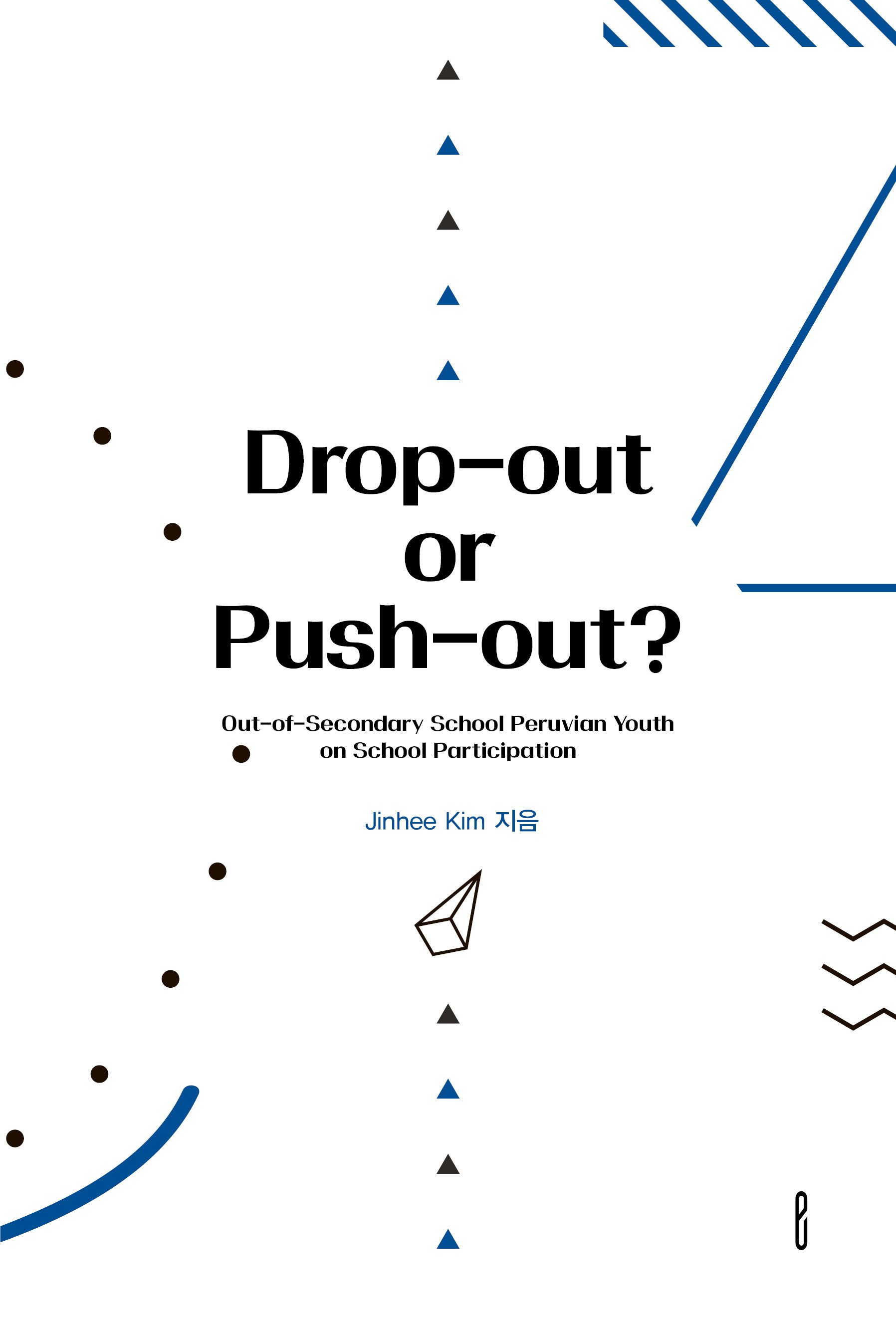Table of Contents (목차)
Chapter 1. Introduction (서론) 6
1.1 Statement of the problem (연구 문제) 6
1.2 Research aim and research questions (연구 목적 및 연구 질문) 6
1.3 Rationale (연구 의의) 7
Chapter 2. Literature Review (이론적 배경) 9
2.1 Construction of childhood and the place for young people in research (유년기와 청소년에 대한 고찰) 9
2.2 Opportunities and obstacles in SE participation (중등 교육 참여의 기회와 제한점) 12
2.3 Responding to the challenges (중등 교육 중도퇴학에 대한 대응책) 16
Chapter 3. Country Context (국가 분석: 페루) 21
3.1 Socioeconomic context (사회경제적 환경) 21
3.2 Education sector context (교육 환경) 23
3.2.1 Structure of education (교육 체계) 23
3.2.2 Coverage and access (중등교육 현황) 23
3.2.3 Education quality (교육 수준 및 질) 26
Chapter 4. Research methodology (연구방법) 31
4.1 Research design (연구설계) 31
4.1.1 Participatory workshop (참여적 워크숍) 32
4.1.2 Individual interviews (개별 면담) 37
4.2 Samples and data collection methods (연구 참여자 모집) 37
4.3 Data analysis method (연구 분석 방법) 38
4.4 Ethical consideration (윤리적 고려) 42
4.5 Limitations, positionality, and bias (연구한계) 43
Chapter 5. Research findings and discussion (연구 결과 및 논의) 46
5.1 Youth' perceived opportunities for SE participation (청소년이 인지하는 중등교육의 가치) 46
5.1.1 SE as a springboard out of rural poverty (빈곤oduction (서론) 6
1.1 Statement of the problem (연구 문제) 6
1.2 Research aim and research questions (연구 목적 및 연구 질문) 6
1.3 Rationale (연구 의의) 7
Chapter 2. Literature Review (이론적 배경) 9
2.1 Construction of childhood and the place for young people in research (유년기와 청소년에 대한 고찰) 9
2.2 Opportunities and obstacles in SE participation (중등 교육 참여의 기회와 제한점) 12
2.3 Responding to the challenges (중등 교육 중도퇴학에 대한 대응책) 16
Chapter 3. Country Context (국가 분석: 페루) 21
3.1 Socioeconomic context (사회경제적 환경) 21
3.2 Education sector context (교육 환경) 23
3.2.1 Structure of education (교육 체계) 23
3.2.2 Coverage and access (중등교육 현황) 23
3.2.3 Education quality (교육 수준 및 질) 26
Chapter 4. Research methodology (연구방법) 31
4.1 Research design (연구설계) 31
4.1.1 Participatory workshop (참여적 워크숍) 32
4.1.2 Individual interviews (개별 면담) 37
4.2 Samples and data collection methods (연구 참여자 모집) 37
4.3 Data analysis method (연구 분석 방법) 38
4.4 Ethical consideration (윤리적 고려) 42
4.5 Limitations, positionality, and bias (연구한계) 43
Chapter 5. Research findings and discussion (연구 결과 및 논의) 46
5.1 Youth' perceived opportunities for SE participation (청소년이 인지하는 중등교육 참여의 가치) 46
5.1.1 SE as a springboard out of rural poverty (중등교육, 빈곤에서 벗어나는 발판) 47
5.1.2 SE as an important space for building friendship (중등교육, 우정을 쌓기 위한 중요한 공간) 49
5.2 Youth' perceived obstacles to SE participation (청소년이 인지하는 중등교육 참여의 장애물) 50
5.2.1 Demand-side: Individual factors (개인적 요인)52
5.2.1.1 Youth health (청소년 건강) 52
5.2.1.2 Early pregnancy (조기 임신) 53
5.2.2 Demand-side: Family-related factors (가족관련 요인) 54
5.2.2.1 Household financial circumstances (부모의 경제력) 54
5.2.2.2 Household perceived value of SE (부모가 인지하는 교육의 가치) 56
5.2.3 Demand-side: Friends-related factors (친구관련 요인) 58
5.2.4 Supply-side: Quality of education (교육의 질) 61
5.2.5 Supply-side: Corporal punishment (체벌) 63
5.3 Youth proposed solutions for SE Dropout (청소년이 생각하는 중등교육 중도퇴학에 대한 해결책) 66
5.3.1 Curriculum/pedagogy development (교육과정 개발) 66
5.3.2 Second-chance education (재교육의 기회) 68
5.3.3 Financial support (경제적 지원) 69
5.3.4 Motivational program & Campaign (동기부여 프로그램) 70
5.4 Discussion (논의) 70
Chapter 6. Conclusions (결론) 74
6.1 Understanding opportunities for and obstacles to SE (청소년의 중등 교육 참여의 기회와 방해요인 이해하기) 74
6.2 Recommendations for future action, research, and policy-making (정책 제언) 75
도서소개
저자소개
목차소개





